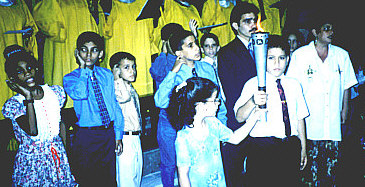General Board of Global
Ministries
![]()
UM Information
![]()
UM Reporter
![]()
Employment
![]()
Archives
![]()
Favorite Places
![]()
![]() Florida Southern College
Florida Southern College
![]()
![]() Bethune Cookman College
Bethune Cookman College
![]()
![]() FL
UM Children's Home
FL
UM Children's Home
![]()
|
|
Centennial celebration was homecoming for missionaries |
|
Photo by Larry Rankin |
During one of the worship services held throughout the 100th anniversary celebration of Methodist missionaries arriving in Cuba, children held the Centennial torch used when the Cubans celebrated their 1983 centennial of the first Cuban lay preachers' arrival in Cuba and the establishment of the first Wesley meeting in Havana in 1883. |
| By Michael WachtLAKELAND — For 38 years
the Rev. Esther Robinson has wanted to have memories of the place she was born. Last
November, the pastor of Cutler Ridge United Methodist Church in Miami had the chance to
visit her birthplace, Mayori, Cuba, and start building those memories as part of the 100th
anniversary celebration of Methodist missionaries arriving in Cuba.
Robinson and her family fled Cuba in 1960 because of the persecution of religious leaders during the revolution led by Fidel Castro. She was very young then and has not been back to Cuba in the 38 years since. Robinson was among 27 people from across the United States invited to the island by the Cuban Methodist Church. Although she spent most of the week in Havana at the official centennial celebration, Robinson visited Mayori with her parents, the Rev. Morrell and Lois Robinson, who were missionaries in Cuba from 1956 to 1960. She discovered memories of a place she had lived, but didn’t know, and some explanations about her life and time there. “It’s just so wonderful to have memories now,” she said. “It [the trip] explained some things in my life. We were not only missionaries, but we were there in a war.” Robinson said she never understood while growing up in the United States why she was afraid of police and police cars, or why, when her mother called a taxi, she thought her family was being taken away. She said she now understands why, as a 2-year-old, she would wake up screaming, “Tiros, tiros (shots, shots)!” “What this experience did for me was to make it all real,” she said. “It was very incarnational: just like Jesus coming in the flesh makes God real — something we can associate with.” Others who attended the event experienced sometimes tearful reunions with old friends or made trips to the towns or churches they had served, said Larry Rankin, director of the Florida Conference’s Missions ministry and son of Dr. Victor Rankin, a missionary to Cuba in the 1950s. “The best part were the opportunities for Cubans and North Americans to meet each other again,” he said. The five-day celebration included workshops on the history of Cuba’s rural missions and the past, present and future of missionaries in Cuba. At night, the group attended worship services with the Cuban Methodists and were able to experience their music, dance and culture. “We worshipped in three great churches in Havana, filled to capacity for celebrating history, worship and music,” wrote Katherine Rankin in her reflections on the celebration. The group also saw and experienced the changes in Cuba and the Cuban Methodist Church that have occurred since their departure. “Politically, I was surprised that the presence of a dictator was not as obvious as I thought it would be,” Robinson said, adding that she had heard people speaking out against their government, even though there are still serious limitations on free speech. For her, the entire experience had a “bittersweet quality.” While the Cubans did all they could to make the visitors feel like honored guests, they also showed their pride in their church. During the Cuban Revolution, many Methodist church leaders fled the country. The ones who remained kept the church alive and rebuilt it without any help from the outside. “They wanted to show us they’re doing well, but that they wanted to re-establish those connections,” Robinson said. Top
of this page |

